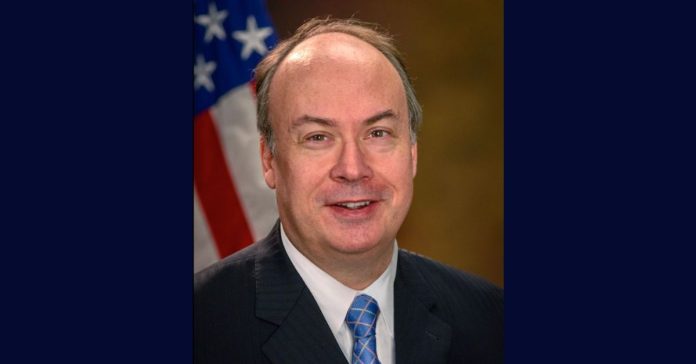
Jeffrey Bossert Clark appears in his official Department of Justice photo. (U.S. Department of Justice)
Former U.S. Department of Justice attorney Jeffrey Clark will face disciplinary proceedings in January 2024 over his efforts to help Donald Trump overturn the results of the 2020 presidential election, the board overseeing his professional misconduct case ruled Tuesday.
The D.C. Bar Office of Disciplinary Counsel filed ethics charges against Clark in July 2022. Those proceedings had been paused for several months. Clark motioned to have the case against him removed to a federal court in October 2022. A federal judge denied that request in June in a lengthy opinion that found federal courts have no jurisdiction over attorney licensing disputes.
Clark is an environmental lawyer whom Trump nearly tapped to be acting attorney general in his waning scramble to retain the presidency. He previously worked as a former assistant attorney general at one sub-agency within the DOJ and an acting assistant attorney general within another. His bar charges are focused on an unsent draft letter falsely claiming the department “identified significant concerns that may have impacted the outcome of the election in multiple states, including the state of Georgia.”
“This statement was false,” Disciplinary Counsel Hamilton P. Fox, III wrote in the specification of charges filed against Clark. “The Department was aware of no allegations of election fraud in Georgia that would have affected the results of the presidential election.”
The specification of charges said that Clark violated D.C. Rules of Professional Conduct 8.4(a) and (c) (“in that respondent attempted to engage in conduct involving dishonesty, by sending the proof of concept letter containing false statements”) and Rules 8.4(a) and (d) (“in that respondent attempted to engage in conduct that would seriously interfere with the administration of justice”). The so-called “proof of concept letter” is the draft Clark compiled that would have urged legislatures in states where Trump lost to “send an unauthorized slate of electors to Congress,” according to the ethics charges.
Late last month, a pre-hearing conference in the case was held, and briefs were submitted by the parties in the days that followed. Specifically, Clark made an expansive discovery request and filed a motion to put the proceedings on hold until March 2024.
In Tuesday’s order, obtained by Law&Crime, D.C. Court of Appeals Board on Professional Responsibility Hearing Committee Number 12 Chair Merril Hirsh denied both of Clark’s requests.
In the request for discovery, Clark asked for a “list of cases where a D.C. disciplinary hearing was held prior to related civil or criminal investigations or litigation elsewhere being concluded,” along with two other lists of cases related to attorneys facing bar sanctions while also facing separate trials elsewhere.
“Respondents in disciplinary matters are entitled only to ‘reasonable discovery’ as provided by the Board Rules,” Hirsh determined. “Mr. Clark’s request seeks discovery that the Rules do not provide.”
In denying the motion for continuance, Hirsh was more critical of the request lodged by the conservative attorney.
“Although Mr. Clark was free to seek the removal of the case if he believed it was warranted by law, nothing prevented him from using the intervening year to prepare his case,” Hirsh wrote. “I am concerned that there seems to be a serial delay – in which at each stage after one or another unsuccessful motion has delayed the proceeding, Mr. Clark asserts a new argument (or repeats an old one) as a basis for seeking additional delay.”
Clark’s disciplinary hearing is slated for Jan. 9, 10, 16, 17, 24, and 25.
Have a tip we should know? [email protected]

